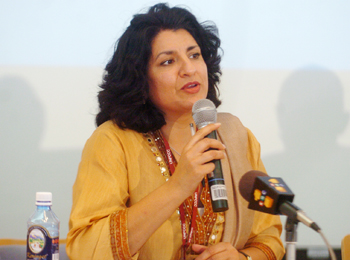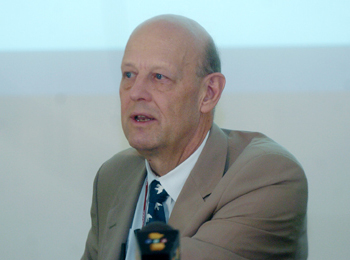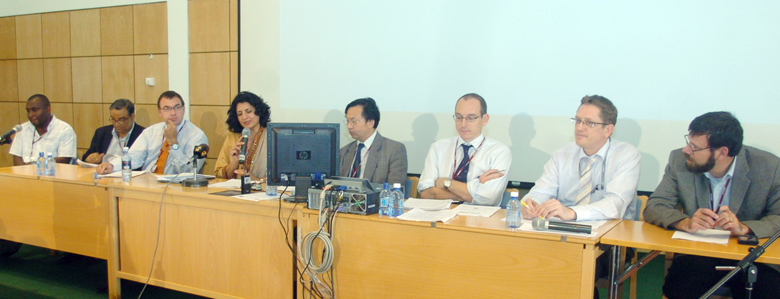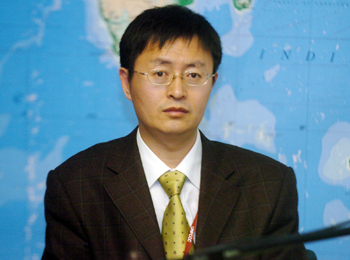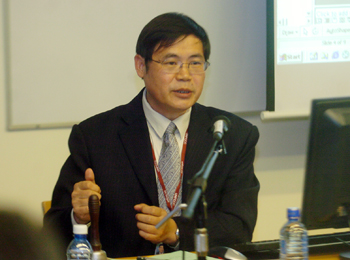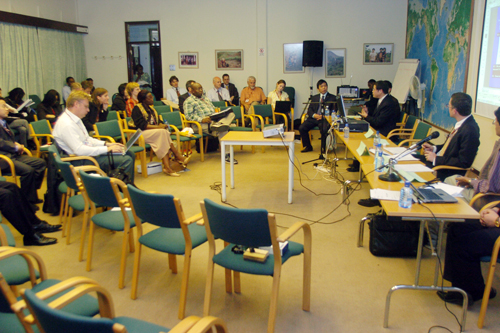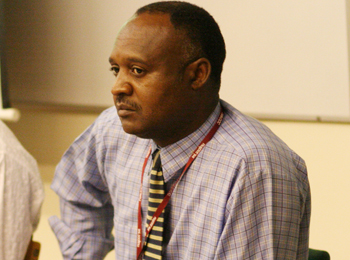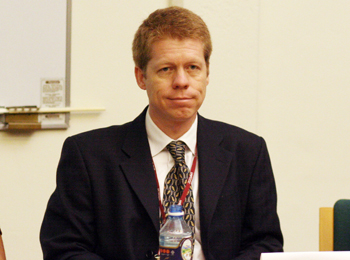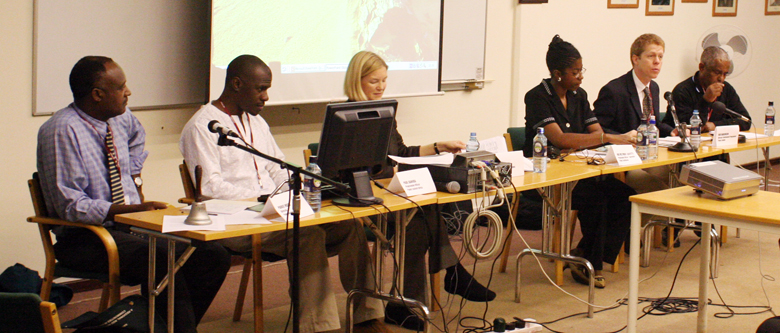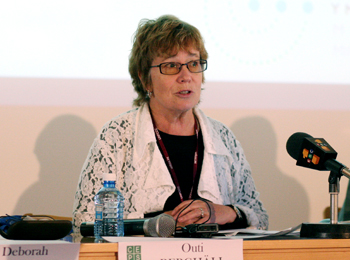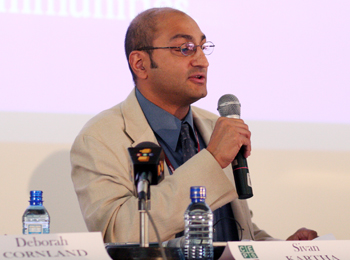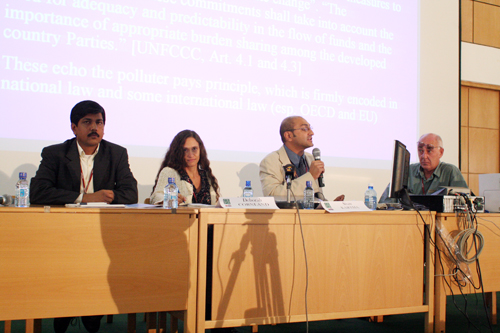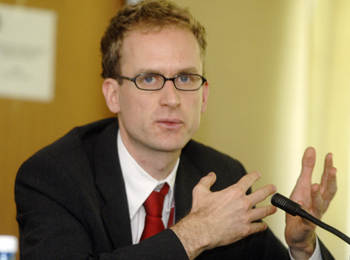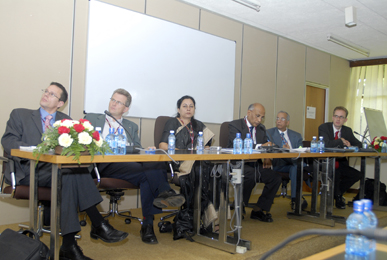 |
||
|
Published by the International Institute for Sustainable Development (IISD)
|
|||
|
A Special Report on Selected Side Events at the Second Conference of the Parties serving as the Meeting of Parties to the Kyoto Protocol (COP/MOP 2) and Twelfth Conference of the Parties (COP 12) to the UN Framework Convention on Climate Change (UNFCCC)
|
|||||
| 6-17 November 2006 | Nairobi, Kenya | |||||
 |
|||
 |
|||
Events convened on Saturday, 11 November 2006
|
The Sao Paulo Proposal for an agreement on future international climate policy Presented by the BASIC Project |
|||
|
Farhana Yamin, Institute of Development Studies (IDS), explained that the BASIC Project, funded by the European Commission (EC), aims to build and strengthen institutional capacity of enhance negotiations on climate change issues in Brazil, China, India and South Africa. She said the Brazil Team is working on the Sao Paulo Proposal (SPP), which addresses tools and methods to discuss future scenarios for climate change negotiations.
Erik Haites, Margaree Consultants, said the SPP aims to create a comprehensive, stable, long-term and universal regime to address climate change. He noted that SPP underscores the UNFCCC’s principles of “common but differentiated responsibilities” and parties’ capabilities to comply with the Convention. He said SPP endorses continuing with Kyoto’s format of Annex I parties’ quantified commitments, which could expand to cover net land use, land-use change and forestry emissions and use emission intensity as a criterion. Haites explained that SPP suggests continuing with CDM for non-Annex I parties, establishing voluntary commitments to promote sustainable development policy and action measures (SD-PAMs), and embracing emission reduction commitments at a later stage. He said that SPP recommends, inter alia: Annex I parties continue to take the lead in combating climate change; geographical benefits for the least developed countries and small island developing states (SIDS) be enhanced; more options for developing countries’ participation be added; and financial support for technology research and development in non-Annex I parties be established. Shaun Vorster, South Africa, highlighted the importance of a stable regime that builds on the Kyoto Protocol. He encouraged SPP to provide more options for Annex I parties’ commitments, especially on financial issues. LU Xuedu, China, suggested that SPP could expand the timeframe for non-Annex I parties’ voluntary commitments, highlighting that SD-PAMs will be implemented by the private sector. He also underscored that commitments for Annex I parties could have more stringent requirements for curbing GHG emissions. PR Shukla, India, said SPP should avoid establishing an architecture that would “lock in” options for future negotiators. He emphasized that voluntarily emission reductions are undertaken by private actors and they should be involved in discussing the issue. Rawleston Moore, Barbados, said the SPP’s choice of stabilization level is an “absolute disaster” and will be unable to avoid the negative impacts of climate change. He underscored that SPP’s suggestions regarding adaptation funds are inequitable as they require SIDS to use the funds’ financial resources to curb emissions rather than to ensure survival of their citizens. Jonathan Pershing, US, noted that SPP advantages include establishing mechanisms to fund technology development and adaptation and highlighted the difficulties in using energy intensity targets as suggested by SPP. Citing the Stern Report, Chris Dodwell, UK, welcomed the establishment of the long-term goals promoted by SPP and emphasized the importance of including positive incentives for countries’ participation. Artur Runge-Metzger, EC, expressed skepticism over the likelihood that businesses will implement voluntary commitments and suggested that SPP engage the private sector in discussions. |
|||
|
|||
|
Low carbon development: an assessment of potential for the use of incentives in China Presented by RCSD |
|||
|
Jiahua Pan, Research Centre for Sustainable Development, Chinese Academy of Social Sciences (RCSD-CASS), explained that while absolute low carbon development is feasible for developed countries, relative low carbon development is currently more attainable for developing countries.
Guiyang Zhuang, RCSD-CASS, introduced China’s target to reduce energy intensity by 20% during the period 2006-2010 and highlighted the potential for incentive methods and technological diffusion to help achieve this target. Matthew Allen, Department for Environment Food and Rural Affairs, UK, described the UK’s participation in the EU ETS as a successful example of using an incentive-based approach to promote low carbon development. Anhua Zhang, RCSD-CASS, discussed three ways in which energy efficiency has increased and will continue to increase in China, namely, through reductions of coal consumption per unit of power generated, internal consumption power and power losses. Fergus Auld, Foreign and Commonwealth Office, UK, stressed the role of a “deep and liquid” global carbon market in achieving low carbon development. Yanzhong Wang, CASS, noted the complex interactions of numerous factors, including natural ones, which lead to global warming and called for “scientific” and low carbon development. Vivek Kumar, The Energy and Resources Institute, stated his “appreciation” for the low carbon development concept, stressing that the role of Annex I parties, particularly with regards to technology transfer and addressing intellectual property rights, must not be overlooked. Participants discussed, inter alia, the likelihood that China will achieve its energy efficiency targets and CDM’s potential contribution to low carbon development. |
|||
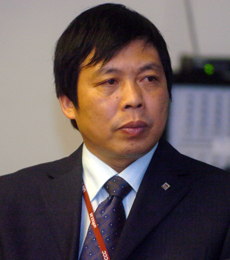 |
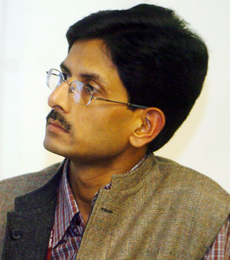 |
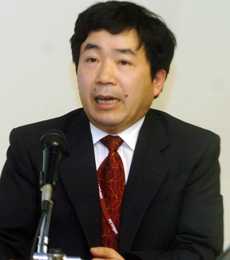 |
|||||
|
Anhua Zhang, RCSD-CASS
|
Vivek Kumar, The Energy and Resources Institute
|
Yanzhong Wang, CASS
|
|||||
|
|||
|
Local voices, global choices: A development agenda for communicating climate change Presented by Panos |
|||||
|
Teresa Hanley, Panos London, noted her organization’s activities and highlighted the findings of the Stern Report, which she said underscores the importance of addressing a broad public debate for those most affected by climate change. Rod Harbinson, Panos London, explained that Panos’ work on climate change focuses on creating policy coherence, media development and community empowerment. He said that CDM projects continue to be top-down and highlighted the need to find ways to ensure true sustainability. He suggested that while the rising importance of adaptation provides more scope for local inclusion, work remains to be done towards building stronger community participation. Indi Mclymott-Lafayette, Panos Caribbean, outlined her organization’s efforts on community adaptation in Jamaica, focusing on mainstreaming community voices into the media. She explained that the mainstreaming process includes producing oral testimonies from the community, building community capacity in articulating their needs to the media and a future stakeholder’s workshop to enhance dialogue with policymakers. Paul Banoba, Panos Eastern Africa, highlighted the role played by the media in Eastern Africa in enhancing understanding of technical issues relating to climate change among both the public and the media itself. Tamre Teka, Panos Ethiopia, emphasized that climate change has affected Ethiopia greatly and elaborated Panos’ activities on building environmental awareness through community radio programmes. Emphasizing the impacts of climate change in Southern Africa, Parkie Mbozi, Panos Southern Africa, noted that there is insensitivity within the media itself to climate change issues. Participants discussed the practicalities of working with communities, the need for more public broadcasting avenues and the movement towards community media. |
|||||
|
|||
|
Adaptation as a strategic issue in the climate negotiations: What way forward? Presented by European Climate Platform (ECP) |
|||
|
Sivan Kartha, Stockholm Environment Institute, highlighted findings from the draft “Adaptation as a Strategic Issue in the Climate Negotiations” report, including that: adaptation must be intrinsically linked to development; financing for adaptation must transition beyond discretionary, voluntary contributions; and adaptation is site-specific but requires facilitation from global, national and sub-national actors.
Outi Berghäll, Finnish Presidency of the EU, outlined EU priorities for adaptation. Noting that adaptation and mitigation are complementary, she said mitigation is the most important adaptation policy but that where it is not possible, planned adaptation is more cost-effective than reactive adaptation. Frode Neergaard, Denmark, suggested that if adaptation is framed as a climate change challenge it remains a “stand alone” issue, whereas if it is framed as a development challenge, it can be mainstreamed into the “bigger picture.” He argued that to mainstream adaptation effectively, it should be planned for in broad national and donor development plans, implemented by sector ministries and via sector programmes and financed from national budgets and overseas development assistance (ODA). He said the UNFCCC should be part of the framework for addressing adaptation but that other key actors must be included. Mozaharul Alam, Bangladesh Centre for Advanced Studies, wondered how incorporation of adaptation in ODA would affect demonstrability of fund additionality. He also cautioned that incorporation of adaptation into loan-financed programmes from development banks could amount to taxing developing countries to address their climate change issues. Phil O’Keefe, ETC International, noted that the total UNFCCC-related funds for adaptation support over the next five years (excluding the Adaptation Fund) amount to only half the total funds spent on humanitarian assistance in 1989. He emphasized that ODA funds are under significant pressure and that government funds are a more suitable source of adaptation-support funding. He further noted that countries are willing to contribute ODA for “one-off” mitigation initiatives but are less willing to contribute ODA for “ongoing” adaptation initiatives. Participants discussed: how to divide resources between mitigation and adaptation efforts; the role that the UNFCCC will play in mobilizing funds for adaptation; and the need for adaptation and environmental education in both developed and developing countries. |
|||
|
|||
|
Centralized determination and publication of baseline data for CDM projects in the electricity sector Presented by German Emissions Trading Association (BVEK) |
|||
|
Pamposh Bhat, GTZ CDM India, introduced the event while U.N. Pahjiadd, Ministry of Power, India, noted the importance of developing tools to calculate baselines for CDM projects in the electricity sector.
Einar Telnes, Det Norske Veritas (DNV), summarized baseline data for CDM projects in the electricity sector and outlined Designated Operational Entities (DOEs) experiences. He argued that similar effort levels are needed to develop baselines for both small- and large-scale projects. Telnes said that standardization through methodologies have eased and improved assessment of baselines. He also noted that when data cannot be verified, DOEs request deviation or proxies from the CDM Executive Board. V. S. Verma, Central Electricity Authority (CEA), India, described the power sector in his country and said that CEA established a national baseline for the sector. He underscored that precise data was collected from a large number of power stations and different energy sources. He said India does not have a national grid, and for each of the countries’ grids a baseline was developed. Urs Brodmann, Factor Consulting AG, explained that his company assisted CEA in preparing the carbon dioxide baseline for the Indian power grid, which can be applied to CDM projects that replace grid electricity, such as renewable energy and energy efficiency projects. Brodmann said his aim was to provide a tool for CDM project developers that can be used to reduce their transaction costs and increase accuracy and consistency of emission reduction calculations. Lambert Schneider, Oeko Institute, presented methodology tools that are being developed to facilitate the proposal of new methodologies by CDM developers. He explained Oeko’s ongoing work to develop a new tool to calculate grid emission factors. |
|||
|
|||
|
||
|
Click the above button to go back to our ENB main coverage
|
||
|
|
|
|
|
||
|
